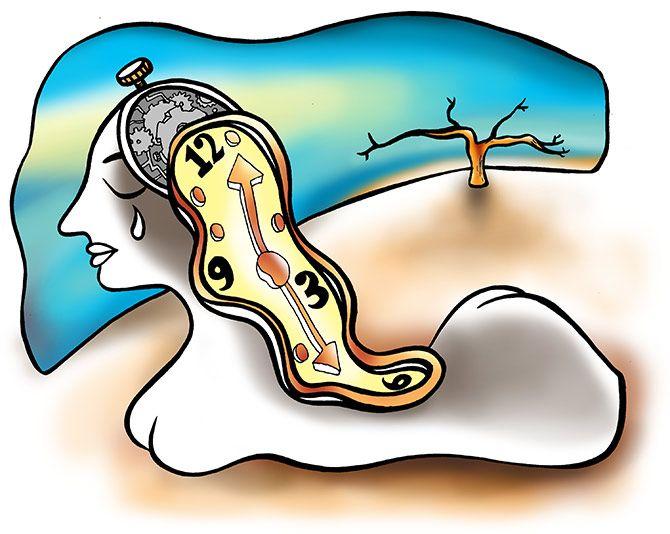The persistence of memory: What it means to be human
To get such articles in your inbox
Text size: A A A
April 07, 2016 20:45 IST
Deep-learning machines are conquering realm after realm of human expertise, but is there a difference between Them and Us?
I think the only thing that distinguishes us from the machines is memory. It is what makes us human, says Rajeev Srinivasan.
Illustration: Uttam Ghosh/Rediff.com
I think the only thing that distinguishes us from the machines is memory. It is what makes us human, says Rajeev Srinivasan.
Illustration: Uttam Ghosh/Rediff.com

In the wake of the astonishing feat by Google's AlphaGo machine in defeating, nay thrashing 4-1 the world's best player of Go, it is time for us to wonder what it is that is truly human, that which distinguishes us from the machines.
Deep-learning machines are conquering realm after realm of human expertise, from chess to natural language to Go to other domains, and there is no reason to imagine their progress will come to a halt any time soon.
Some of us may worry that the machines will replace us in more and more jobs; not only the menial, 'dirty, dangerous, difficult' jobs that we don't want to do, but also the ones, including the creative ones, that we like to do.
But is there a difference between Them and Us? I used to think that it was obvious, that they could never be like us, that they were just machines. Now I am not so sure.
I think the only thing that distinguishes us from the machines is memory. It is what makes us human. Memory is so fundamental to us that anything that interferes with it is a great loss. In the Abhijnana Sakuntalam, Dushyanta forgets his beloved Sakuntala, and the epic poem is based on that one fact, and, later, his recovery of that memory. In The English Patient, the most poignant detail is the old, well-thumbed volume of Herodotus that the aviator carries with him, with notes about the woman, not his wife, that he loved.
A person who is suffering from dementia, say Alzheimer's disease, and thus losing their memory, slowly but surely becomes somebody else, not the person that we knew. In a way, we are the sum total of our memories, because the chemicals that we are all made of are very simple and very indistinguishable. It is those electrical impulses in our brains that make us who we are.
I find it striking that the three greatest science fiction films of all time -- and they are genuine classics -- all have as a significant scene or even a theme the issue of memory.
In the brilliant Blade Runner, there is the beautiful Rachel, who doesn't know that she is a cyborg, a Replicant, because she has been implanted with memories borrowed from a young woman, now dead. She thinks she is that person. The Replicants know who they are, the limits to their lives, and they also know that Blade Runners, assassins, are out to kill them. The irony in the film is that the quasi-hero, the Blade Runner Deckard, may himself be a Replicant, and we suspect that because the police chief leaves a hint that he knows Deckard dreams of unicorns.
But by far the most remarkable scene in the film is the 'tears in rain' monologue when the fugitive cyborg Roy Batty, who is dying, says in what may be the most arresting soliloquy in cinema history:
I've seen things you people wouldn't believe. Attack ships on fire off the shoulder of Orion. I watched C-beams glitter in the dark near the Tannhauser Gate. All those moments will be lost in time, like tears... in rain. Time to die.'
With that magnificent speech, Batty rises above his Replicant-ness, and he is as human, or more human, than any of us. It is hard to watch that scene without a lump in your throat, and Batty, whom we have seen so far as a cold-blooded, dangerous killer, transcends his cyborg nature and transforms himself: Indeed, he becomes the hero of the film.
1 comment:
Various futurists, including Elon Musk, have speculated about a future where people will be outfitted with chip implants, so that we'll all be connected to the cloud, and able to download and upload experiences at will, thus partaking in a "collective memory". The internet in its current state is a rudimentary form of collective memory, allowing us to feature and distribute our individual experiences to others. As the internet and its various personal connectivity devices evolve over time, they will allow us to interface in progressively more intimate ways.
Post a Comment